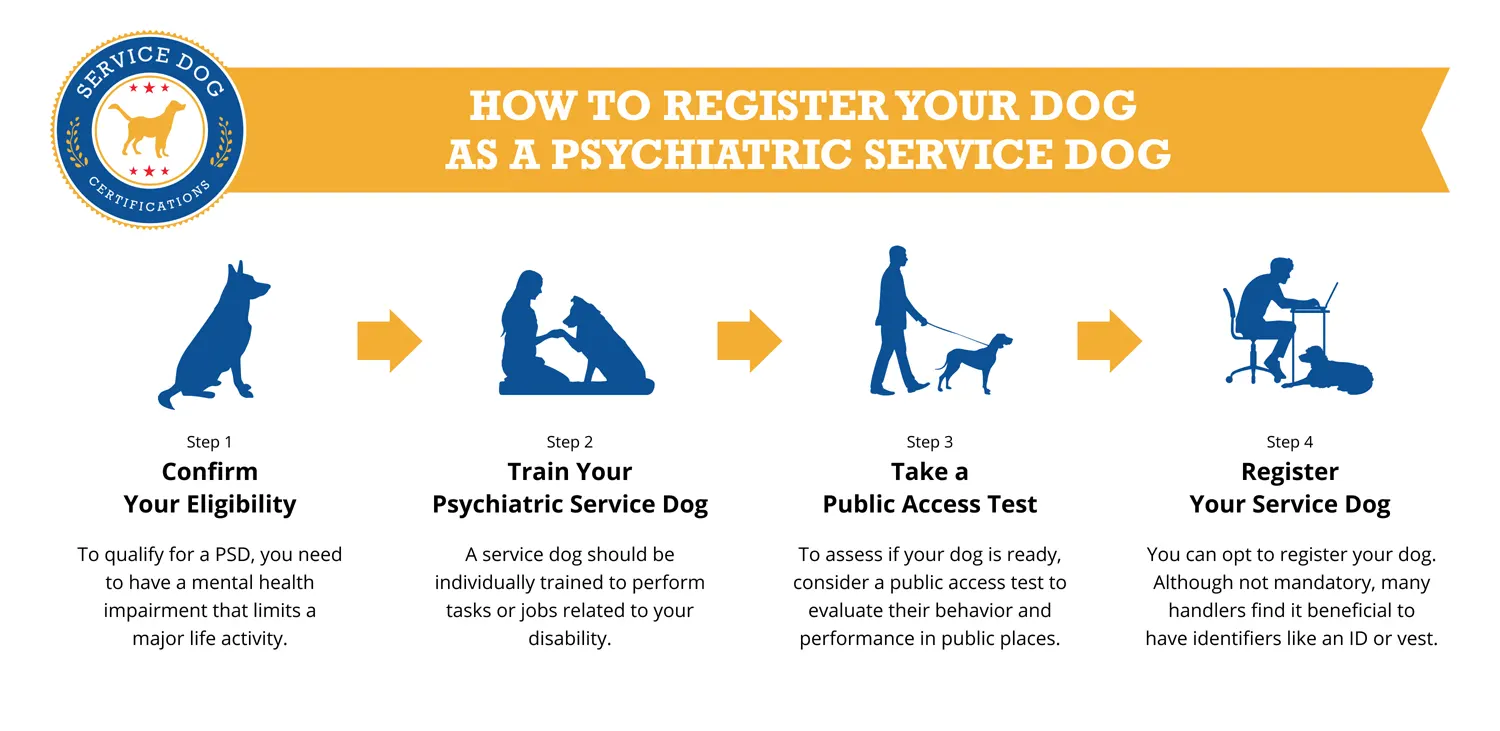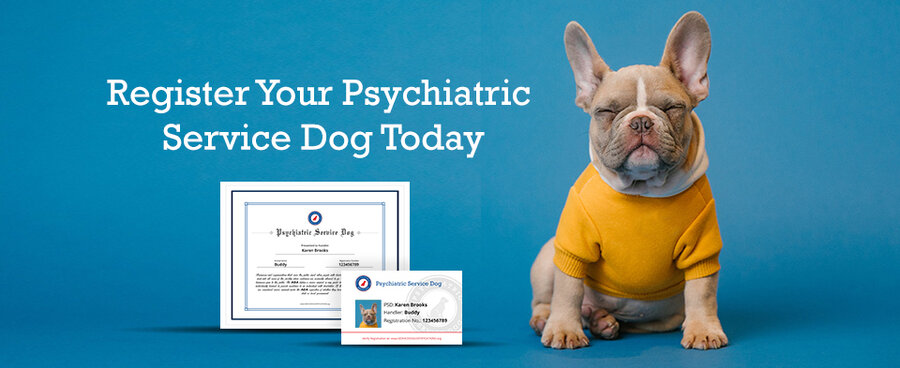How to Register Your Dog as a Psychiatric Service Dog

Do you struggle with a psychiatric disability that significantly impedes your daily life? Do you need a dog at your side to help with your condition?
If so, you might be eligible for a psychiatric service dog (PSD). In this guide, we’ll provide a quick overview of qualifying your canine companion as a PSD and explain what registering a PSD means and whether you need to do it.
Background
A PSD is a specialized service dog trained to perform specific tasks that assist individuals with mental or emotional disabilities. These tasks could include alerting the handler to an impending panic attack, calming the handler during periods of distress, retrieving medication, or waking the handler up.
In order to qualify for a psychiatric service dog, you need to meet two conditions: 1. You must have an ADA psychiatric disability, and 2. You must have a dog that has been fully trained to perform a job or task that directly helps with that disability.
How to Register Your Dog as a Psychiatric Service Dog
- Confirm Your Eligibility
To qualify for a psychiatric service dog, you need to have a mental health impairment that limits a major life activity. If you’re unsure, a licensed healthcare professional can evaluate you and provide a PSD letter.
- Train Your Psychiatric Service Dog
A service dog should be individually trained to perform tasks or jobs related to your disability.
- Take a Public Access Test
Service dogs are expected to perform their duties effectively in public settings. To assess whether your dog is ready, consider a public access test to evaluate their behavior and performance in public environments.
- Register Your Service Dog
Once you qualify, you can opt to register your dog with registries like ServiceDogCertifications. Although not mandatory, many handlers find it beneficial to have identifiers like a registered identification card, tags, or vests to signify their dog as an assistance animal, thus avoiding potential misunderstandings.
Share this image on your site
The Benefits of Registering Your Psychiatric Service Dog
navigating public spaces. While not a legal obligation, registration, along with identifiers like an ID card and a vest, communicates that your dog is more than a pet – it is a crucial working animal that should remain by your side.
Final Thoughts
If you’re unsure whether a psychiatric service dog could help you, talk to your mental health professional or doctor. You can also consult a professional trainer if you have questions about the training process.
Psychiatric service dog owners are allowed to train their dogs without any external help, but for novice trainers getting the advice of a professional can be invaluable.
About the Author: The writing team at Service Dog Certifications is made up of folks who really know their stuff when it comes to disability laws and assistance animals. Many of our writers and editors have service dogs themselves and share insights from their own experiences. All of us have a passion for disability rights and animals.
Related Articles

Hipster Dogs: Trendy Pups, Beards, and Beanies
From PBRs to beanie caps, and from plastic sunglasses to “pawsome” music, hipster dogs have taken the world by storm — and there’s no turning back. Because, let’s face it, these little guys and gals were rocking the style before it was cool — not that they would care what’s cool, though. For a “pawsitevly” […]

Read More

How Dogs Can Calm Anxiety
A person suffering from anxiety attacks experience many risks, and it’s one of the reasons why it’s prudent to consider having a service dog or emotional support animal as a companion. The animal can keep the environment safer for the individual and below are some of the ways a dogs can calm anxiety: 1) Dogs […]

Read More

Can Cats Be Service Animals?
Having a cat brings the same positive effects as dogs. These pets can be equally beneficial to a person’s health. Experts have proven that cat owners are less likely to have a health emergency, such as a heart attack, with their feline companion around and cats have also been proven to help alleviate sleeping disorders, […]

Read More



What do I do if my dog qualifies as a PSD but because I was unaware of the distinction I registered her as an ESA on another site?
You may want to talk to the therapist that has issued your ESA letter. Maybe they offer to rewrite your letter to a PSD letter, which will attest that you qualify for a PSD under current federal and state laws. While that letter is not required, it may help as additional proof if ever any disputes are happening. You may find this article with additional information on how to get a PSD interesting https://www.servicedogcertifications.org/how-to-get-a-psychiatric-service-dog/
I am getting push back from my State job about my dog. They are saying that a therapy dog can’t come to work with me and that a psychiatric dog is the same s a therapy dog.
Psychiatric service dogs are not the same as therapy dogs. A PSD must be trained to perform a job or task relating to a handler’s specific disability.
Is this recognized as a service animal through the ADA? The ADA does not acknowledge emotional support animals as actual service dogs
An emotional support animal is not a service dog. A PSD is a service dog! You can take an online class and train your fur baby yourself. Then doggie will qualify as an actual service dog.
How much does it cost to register as a psych dog
Please see this link for more info: https://www.servicedogcertifications.org/psychiatric-service-dog-registration/